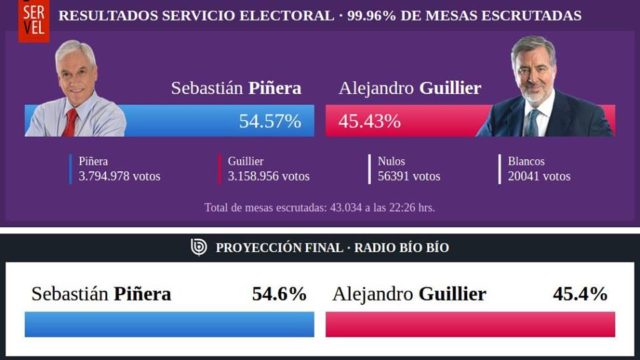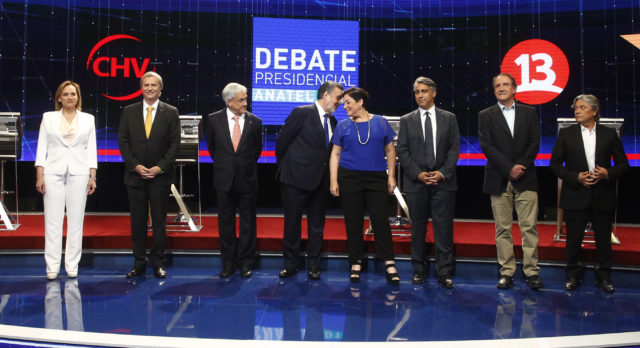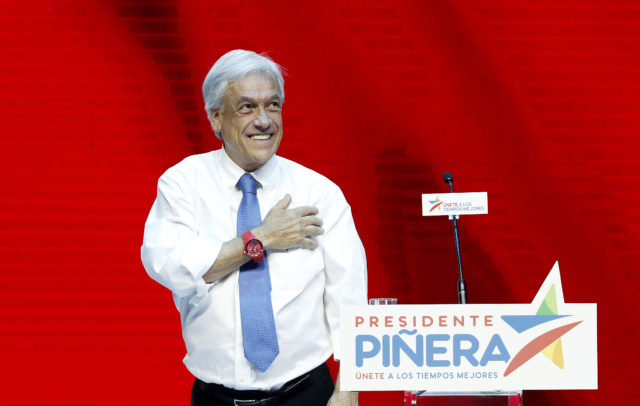Sebastián Piñera was elected Chilean president with 54,57% of preferences on Sunday’s run-off election, beating former news anchor Alejandro Guillier.
This will be Mr Piñera’s second term in office.
He will be inagurated on 11 March 2018 and will receive the presidential sash from Ms Bachelet, just like it already happened on 11 March 2010.
Read as well: Piñera delivers unifying speech after bitter campaign and landslide victory

His story
Miguel Juan Sebastián Piñera Echenique, best known as Sebastián Piñera, was born in Santiago on 1 December 1949 to Magdalena Echenique and José Piñera. He is married to Cecilia Morel and has four children: Magdalena, Cecilia, Sebastián and Cristóbal.
He graduated from Universidad Católica with a business major and he completed his Ph.D. in Economics at Harvard University in 1976.
He was a senator for East Santiago from 1990 to 1998 and president of Chile from 2010 to 2014, after two unsuccessful candidacies in 1999 and 2005.
Mr Piñera is one of Chile’s most recognized businessmen. In 1997, he entered the private sector as a member of Infinco, a financial and risk assessment consultancy.
In 1978, he was appointed CEO at Banco de Talca, but resigned after the board asked him to leave. In 1979, he created Bancard S.A., the company that brought to Chile both Visa and Mastercard.
Later, he went on to buying 16% of LAN, nowadays Latam -an airline-, became a shareholder of Entel -telecommunications- and Blanco y Negro -football-.
He also invested in AntarChile -a fishing, oil and forestry holding- and Quiñenco, a financial, manufacture, energy, transport and port services holding.
He also bought Chilevisión -a TV station- and the pharmaceutical FASA, among others.
Before his own career in politics, he was no stranger to that world. His father was ambassador to the UN, he is brother to José Piñera, who was a cabinet member under general Pinochet’s dictatorship, and he was head of Hernán Büchi’s campaign in 1988, who also had a seat in Pinochet’s cabinet.
He is nephew to Bernardino Piñera, who was Temuco bishop from 1960 to 1977 and archbishop of La Serena from 1983 to 1990. He is also cousin to Andrés Chadwick, a former minister as well.
His name was in the polls even before he decided to run for a second term. When he announced his decision, Piñera was backed by all the right-wing parties and faced a primary, which he won.
The first round was supposed to be a resounding success for him, as all pollsters thought he was going to surpass the 40% mark, though he fell short and gained only 36,64%, followed by the current coalition in power’s candidate, led by president Bachelet, Mr Guillier.

The campaign on the run-up to the first round was fierce and complex. After that and convinced that he needed to appeal to those unhappy with Bachelet’s administration, he moved to the political centre, changing -for example- his opinion about free university fees for the 60% most vulnerable.
During his first term, Mr Piñera defined Education as a “consumer good”. His view changed a week before the run-off election and stated that he “had always believed it was a public good”, and that free-of-charge university should exist to some extent.
His change of mind was key to convince the opposition to pass the bill that seeks, in the future, to ensure free university for all.
Mr Piñera also failed to receive the support of important international figures, but he was heavily cheered by Chilean corporate leaders.
On the other hand, Mr Guillier was backed by former Uruguayan president, José Mujica, Britain’s Jeremy Corbin, young people, the left and the centre-left, including Frente Amplio (Broad Front), Chile’s third political force, coalition that abruptly transformed Congress’ landscape by gaining one senator and twenty representatives in the House after November’s General Election.
Even though his win was unquestionable, Mr Piñera was chosen in an election in which 6.956.121 people participated -both domestically and abroad- out of the 14.308.131 eligible to cast ballots, 48,6% of the electoral roll.







 Enviando corrección, espere un momento...
Enviando corrección, espere un momento...





